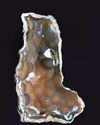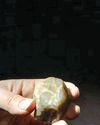
It is only found in the Lake Baikal region of eastern Siberia. Seraphinite acquired its name after Seraphim, the biblical highest order of angels, because of its shimmery, feather-like appearance.
SERAPHINITE PROPERTIES
The mica inclusions give the stone wonderful chatoyancy. The inclusions grow at different lengths, the longer ones give that feather appearance. Other times you get shorter growth patterns in rows that give the mystic forest appearance. The radial growth patterns in this stone are more highly sought after and make for beautiful designs in cabochons.
FINDING SERAPHINITE
This story is from the October 2022 edition of Rock&Gem Magazine.
Start your 7-day Magzter GOLD free trial to access thousands of curated premium stories, and 9,000+ magazines and newspapers.
Already a subscriber ? Sign In
This story is from the October 2022 edition of Rock&Gem Magazine.
Start your 7-day Magzter GOLD free trial to access thousands of curated premium stories, and 9,000+ magazines and newspapers.
Already a subscriber? Sign In

Rockhounding Ohio's Lake Erie Islands
A short ferry boat ride three miles from Ohio’s Lake Erie coastline is South Bass Island, better known as Put-in-Bay or the “Key West of the North.”

Iowa's Hidden Treasures
Exploring Keokuk Geodes: How They're Made & What's Inside

Agatized CORAL
Florida's Collectible State Stone

Rockhounding Florida's Beaches
Beachcombing serene stretches of Florida can reveal fascinating finds like fossilized shark teeth, sea glass, quartz, agate and even coral fragments.

Collecting Staurolite
Hot Spots In Virginia & Georgia

Pecos Valley Diamonds
New Mexico's Ancient Attraction

12 Tips for Rockhounding Tucson's Greatest Shows
Tucson in February becomes the international hub for buying and selling colored gems, rocks, minerals and fossils.

Turquoise in the American Southwest
A Water & Sky Souvenir

Touring Colorado's MINERAL BELT
It's a Showcase of Mining History & Minerals

Geology &Colorado's Taurish Traiks
Most of Colorado’s tourist trains today were originally constructed in the late 1800s to serve the state’s lucrative mining operations.